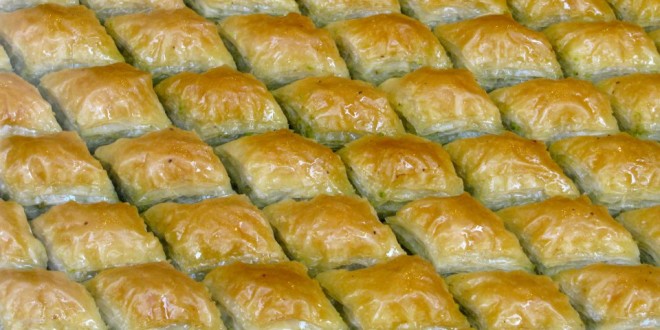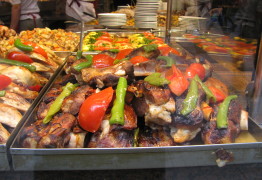I have never lived in a place in which people are more involved with food. Wherever I go, at whatever time of day, I see coffee shops, restaurants and cafes full of people. Fresh fruit and vegetable stands burst with color in every neighborhood, more so in the poorer areas. Simits, pretzel-like bagels, are sold from carts everywhere in the city. Once I commented to a rather indifferent store clerk that I was going to eat at a nearby restaurant. He immediately brightened up, came out from behind his counter and spent ten minutes describing the menu and advising me exactly which items to order.
“How often do Turks eat out?” I asked, and the reply was, well, perhaps five or six times a week. You are probably wondering, are Turks fat? The answer is no. It is not uncommon to see someone carrying an extra few extra pounds, but you do not see obese Turks. Why not? I think it’s a combination of reasons. First, portions in restaurants are not oversized. Second, restaurant food—indeed all Turkish food—involves a myriad of vegetables. Third, this is an outdoor culture, and Turks perhaps get out and walk more than Americans. And perhaps smoking plays a role. More Turks than Americans seems to smoke although, thankfully, the practice has been banned in restaurants.
People ask me if Turkish food is spicy. Yes, spices are used, but no, Turkish food is not “hot.” One of the mostly commonly used spices is kekik, thyme. Other popular seasonings are garlic, parsley, onion, lemon, sweet peppers and oregano. Sumak, a reddish powder made from the berries of sumac bushes, is used on salads for astringency, like lemon or lime. Another much-employed ingredient is nar, pomegranate molasses, a wonder ingredient that makes both sweet and savory foods taste better. There was an interesting article about pomegranate molasses last year in the New York Times:
http://www.nytimes.com/2010/03/24/dining/24power.html
Speaking of unusual new tastes, I am getting used to rose flavoring. I have tasted this in India, mostly in beverages, and it has always been a less-than-pleasant surprise. I need a heads-up if I am going to be drinking something that tastes like perfume. Here in Turkey, however, the flavor is used more subtly.
The first time I tried it was an accident. Sankar and I were out for our evening gelato, and, looking at the array of available flavors, I asked what gul was. “Turkish flavor,” came the enigmatic reply and I impulsively said, “I’ll have it.”
At the first bite, I said, “Oh, it’s rose,” and Sankar frowned, “Why don’t you get something you’re sure of?” To prove myself, I finished the cone, and moved one step closer to accepting this flavor. It is common here, and that helps. My dishwashing liquid smells like roses. Occasionally we are served some baklava or other honey-based dessert that tastes rose-y. And I recently bought a jar of rose jam, which is great on toast. It has the same texture as strawberry jam, which begs the question, am I really eating little chunks of roses?!
After finding a simple Turkish cookbook, this week I assembled all the ingredients and made the very first dish I consumed in Turkey back in January, a soup called ezogelin ҁorbasa. The recipe calls for bright orange lentils, almost fluorescent in hue, which cooked up much more quickly than I expected, as did the bulgur. Most of the soup’s ingredients are ordinary: chicken broth, onion, and a little butter. But I recalled tiny black flecks in the soup that appeared to add greatly, but mysteriously, to the flavor. Were they some kind of pepper? Turns out the flecks are dried mint leaves. I bought a packet at the store and used two teaspoonfuls in the soup. You should be here to take a lovely, herby taste. Mmm.
Eggplant is also a new phenomenon here, and I’ve grown to love its silky texture and subtle taste. Growing up in the Midwest, I have little experience with eggplant. I will go to a cooking class in a few weeks and hopefully learn how to prepare this vegetable. One of the most popular eggplant dishes here is dubbed imam bayildi, eggplant stuffed with onion, garlic, tomatoes and parsley. Its name means, “the imam fainted,” in competing stories, either because the eggplant was so tasty or because the olive oil used to make it was so expensive! Here is a photo of that dish, taken at the famous Sirkeci Train Station restaurant in Old Istanbul, the last stop on the Orient Express.
We began to realize the logistics of Turkish vegetable consumption when we visited the Mediterranean coast a few weeks ago. The tomato is the king of Turkish cuisine. It is eaten at every meal, in many, many forms. Chopped up with cucumber, parsley and lemon juice or made into other kinds of salad. Pounded into salsas or chutneys. Used in soups and stews. For breakfast, peeled and sliced, served with cucumbers and white cheese.
But Turkey does not have the kind of climate that supports growing tomatoes outside year-round. With seventy five million people, each eating, let us say conservatively, one tomato per day, that is of course 75 million tomatoes needed each and every day, summer and winter.
Thus the economy of the temperate towns on the Mediterranean coast and perhaps elsewhere, whose main business is growing greenhouse tomatoes. We drove through town after town where the only industry we saw was greenhouses, and when we found ourselves at an elevation, these towns presented strange skylines indeed.
The taste is fine, though purists might disagree. I think they are better than winter tomatoes back home, though not as good as their sun-ripened cousins.
We are going into the most major Turkish holiday next week. It is called Kurban Bayram, and commemorates Abraham’s willingness to slay his son, Isaac, to please God. Instead, a ram was slain, and—not to spoil anyone’s appetite after this food-filled essay—there will be reenactments of this all over Turkey next week. And some fresh lamb as well. More next weekend!





I tuned in to an Internet radio station from Istanbul and had Turkish rap playing in the background as I read your post. Just getting into the spirit. But I couldn’t tell if they were rapping about food…
Happy Thanksgiving, Sue. Hope you can blend the flavors of Turkey and the U.S.!
I hope you and Sankar have a nice Thanksgiving! If you get a chance when you are home, come to Friday morning coffee at Brewberries (9ish). There are 7-8 diehards that still do it and we’d love to see you!